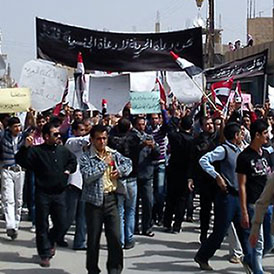Three die in latest Syria violence
Three protesters have been shot dead as fresh unrest breaks out across Syria. President Assad is refusing to back down, but could anger among the country’s Kurdish community be a tipping point?

At least three protesters have been killed by security forces in Syria as the regime of President Bashar al-Assad continues its crackdown on dissent in the country.
Witnesses said the demonstrators died in the southern Damascus suburb of Douma after security forces opened fire.
The three were among a crowd of 2,000 people who gathered at Municipality Square in Douma, chanting: “Freedom. Freedom. One, one, one. The Syrian people are one.”
Teargas was also used on crowds in the Syrian capital, while protests also flared up in the coastal cities of Latakia and Banias.
Pro-democracy activists had called for protests across Syria on “Martyrs’ Friday”.
In what appeared to be a new tactic, armed Assad loyalists joined security forces in gathering around mosques during Friday prayers, waiting for protesters to emerge.
At least six activists were arrested and dozens where beaten as they made their way out of the the Rifaii mosque in the Kfar Sousseh district of Damascus.
Mobile phone footage later emerged showing a crowd inside the mosque shouting: “With our souls, with our blood, we sacrifice ourselves for you, Deraa”, and: “The Syrian people are one, one, one.”
Witnesses said supporters of Assad had attacked crowds with batons. One said: “The regime is using a new tactic. It is no longer security forces alone confronting the protesters, but they are just as brutal.”
There were also reports for the first time of major demonstrations in Kurdish areas in the northeast of Syria.
And around 200 worshippers chanted slogans in support of the southern city of Deraa where the unrest kindled by pro-democracy uprisings elsewhere in the Arab world first erupted two weeks ago.
Since then, an estimated 61 people have been killed in clashes with security forces loyal to the ruling Baath party.
Today’s violence comes after Assad stopped short of making a commitment to meet popular demand for more freedom.
On Wednesday, in his first public appearance since the demonstrations began, Assad declined to spell out any reforms, and made no mention of lifting a 48-year-old emergency law that has been used to stifle opposition and justify arbitrary arrests.
On Thursday he ordered the creation of a panel that would draft anti-terrorism legislation to replace emergency law, a move critics say will give the state much of the same powers it already enjoys.
Assad also promised to investigate the deaths of civilians and security forces in Deraa and in Latakia last week.
And he promised to address the grievances of 150,000 members of the Kurdish ethnic minority in the north and east of the country who have been denied Syrian nationality for 50 years.
Channel 4 News special report – Arab revolt: Middle East uprisings
The Kurdish question
Robert Lowe, an expert on Syria at the London School of Economics’ Middle East Centre, said the move suggested Assad was worried of a repeat of the violent demonstrations by Kurds seen in 2004.
A Kurdish uprising along Syria’s northern border at the same time as continued unrest in the south would force Syria’s security forces to fight a war on two fronts, he told Channel 4 News.
“Syria will be aware of the relative weakness of the Kurish community. They are not a serious threat on their own – they’re not numerous or organised enough.
“But they will be watching the Kurds. It wouldn’t help at all if trouble breaks out along the northern border.”
Mr Lowe said it was too early to comment on the potential significance of a clash between Turkish security forces and Kurdish separatists who crossed over the border from Syria.
Turkish military officials said their forces killed seven Kurdish militants early on Friday after a large group of PKK fighters entered the country from Syria.
It was the largest number killed in a firefight with the PKK, or Kurdistan Workers Party, since last summer.
Syria and Turkey went to the brink of war in 1998 over Syrian support for the PKK, but political and economic ties between Ankara and Damascus have flourished since then. Last year, Syrian security forces rounded up 400 suspected Kurdish fighters.
Turkey is closely monitoring the unrest in Syria and has encouraged Assad to make political and economic reforms.
-
Latest news
-
Taylor Swift’s new break-up album breaks records3m

-
NHS trust fined £200K for failings that led to death of two mental health patients3m

-
Sunak vows to end UK ‘sick note culture’ with benefit reform3m

-
‘Loose talk about using nuclear weapons is irresponsible and unacceptable’, says head of UN’s nuclear watchdog3m

-
‘There wasn’t an Israeli attack on Iran,’ says former adviser to Iran’s nuclear negotiations team7m

-




